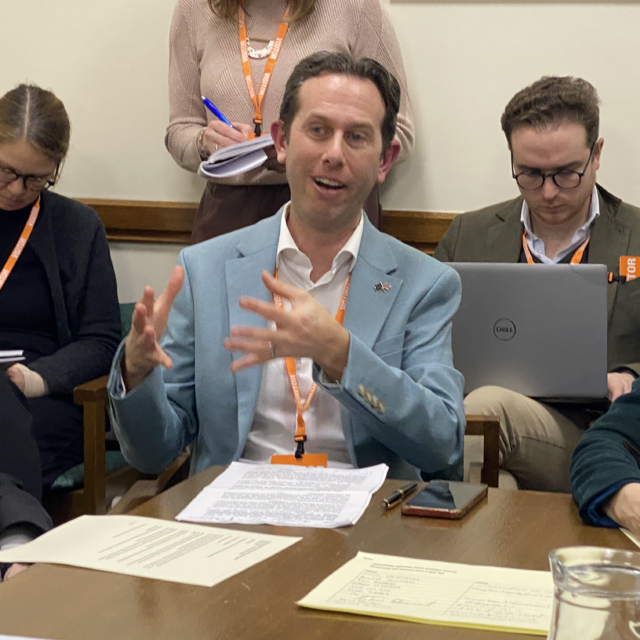Photo by Annie Spratt on Unsplash
A British peer has warned that the UK’s two mainstream political parties may end up finding solace with each other on the beach at Clacton over Brexit.
Lord Balfe was responding to a major new study on the impact of the UK’s EU exit, still the subject of much debate on both sides of the Channel.
The study takes the form of an exhaustive dossier which charts over 2,000 examples of how Brexit has reportedly impacted on life, both in the UK and in Europe.
Lord Richard Balfe is a former MEP who now sits in the British House of Lords.
He told this site: “Only the Liberal Democrats, not my party, have a positive attitude to the EU. If the two major parties are not careful they will find that all informed opinion has deserted them and they can find solace with each other on the beach at Clacton.”
This was an indirect reference to Nigel Farage, himself a former MEP who infamously led the Leave campaign and, since the last UK General Election, is now an MP for Clacton, a seaside town in the south of England.
The dossier was compiled by Anthony Robinson, from citizen journalism outlet “Yorkshire Bylines”, who said some of the “issues” that first arose after Brexit have now been “ironed out”.
But the dossier, which runs to several pages and was updated daily until 26 September 2024, claims there are countless other issues that continue to harm relations between the EU and UK and cause practical difficulties for citizens and industry in particular.
Called the “David Downside Dossier” it charts numerous examples of how Brexit has, according to some reports, impacted negatively on life, both in the UK and in Europe. There are 2,000 downside examples and just 39 positives.
It is named after David Davis, a former UK government minister who enthusiastically championed the idea of Brexit for many years. He was contacted by this site for a comment but,at the time of going to press, had not responded.
Lord Balfe, a former Labour MEP who later joined the Tory Party, said, “This is a pretty long and depressing list of all the problems that leaving the EU has brought us. It was never going to be as simple as was pretended. I remember the £350 million a week for the NHS which never materialised and the shiny new trade deal with the USA which is now forgotten.”
“The fact is that you can rewrite history as the Brexiteers have tried to but you cannot rewrite your geography. Our current government is supposedly in need of massive investment funds but they have not responded to my offers to try and open up lines to the EIB. As I still have contacts there together with a former EIB President I wrote to the Chancellor of the exchequer around a month ago offering to help with contacts. No reply has yet been received,” said Lord Balfe, an MEP from 1979 to 2004 and a peer since 2013.
Also commenting on the dossier, senior MEP David McAllister, Chairman of the European Parliament’s Foreign Affairs Committee, said “The dossier underlines what has been clear all along: Brexit was, is and will always remain a historic mistake that left both the EU and particularly the UK worse off. The Withdrawal Agreement as well as the Trade and Cooperation Agreement (TCA) have significantly softened the impact of Brexit, but a lot of open questions remain.”
The German EPP member adds, “For instance, there is still no formalised cooperation between the UK and the EU on foreign, security and defence policy. At a time of growing geopolitical tensions, the European Commission and the new UK government should work closely together to improve this. I welcome the UK Prime Minister Starmer’s commitment to work towards a reset of our relations, but his government will need to provide more details on how they intend to reshape the EU-UK relationship.”
Sir Graham Watson, a former senior UK Liberal Democrat MEP from 1994-2014, said. “David Davis is among the many Tories who share responsibility for the ongoing disaster of Brexit. The loss of our rights as EU citizens, the fettering of our freedom to live and work on the continent, the red tape and extra cost for business and now the tax rises in Labour’s first budget can all be traced back to Boris Johnson’s Brexit deal. The government’s own Office for Budgetary Responsibility warned them before the vote of the huge cost of Brexit. The Tories ignored it and Corbyn’s Labour Party failed to oppose it. The British people are left to pick up the tab.”
Another former UK MEP Edward McMillan-Scott, one of the longest-serving Vice Presidents of the European Parliament, said, “David Davis was an avid Brexiter all the time I knew him. He is a personable man and is not, as once described by Dominic Cummings ‘thick as mince’, but he made no progress with that experienced politician Michel Barnier when negotiating aspects of Brexit.”
Further reaction to the dossier comes from Dr Denis MacShane, a former Europe Minister under Tony Blair, who said, “This dossier exposes in pitiless detail the damage cutting links with Europe has done to our country. The liars in government 2016-2024 who promised us Brexit would bring nowt but benefits to Britain have now been driven from office never to return.”
But a different view is given by Pieter Cleppe, Editor-in-Chief of BrusselsReport.eu, an opinion website covering EU affairs, who said, “Brexit comes with costs and benefits.”
Brussels-based Cleppe added, “The costs are obvious and mostly relate to extra friction in trade between the UK and the EU.The benefits are less obvious, but they are material: Britain can now independently close trade deals. It hasn’t had much success here, apart from the great achievement to be able to access the CPTPP transpacific trade arrangement. Britain has not exploited the opportunity to have a bonfire of EU regulations, so it has missed out on this Brexit benefit, but it is unlikely to copy all of the new, innovation-hostile regulations the EU continues to churn out, both in the digital and energy sphere.”
“When it comes to energy policy, the UK remains firmly on the same line of the EU, supporting unreliable renewables. When this will appear to have failed, it will be easier for the UK to implement changes than it would have been as a member of the EU.”
“In that sense, the benefits of Brexit will only be visible after a long time. In an ideal world, the UK would have stayed in the EU, but then a reformed EU, focused on scrapping trade barriers and not micromanaging society.”




